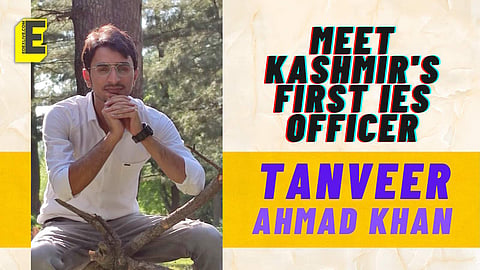

Tanveer Ahmad Khan has been in the news lately and for all the right reasons. He recently became the first Indian Economic Services (IES) Officer from Jammu and Kashmir. Tanveer comes from the Kulgam district in the valley and was on the road to research in Economics before he cracked the IES exam. After completing his graduation from Government Degree College Boys, Anantnag, Tanveer went to Kashmir University for his post-graduation in Economics and then to the Institute of Development Studies, Kolkata for his MPhil.
We caught up with the researcher who is soon to become a civil servant but aims to remain just as inquisitive all his life. Excerpts from the conversation:
You were into hardcore research. Why IES?
When I was studying at Kashmir University, my colleagues and teachers had often told me that I should opt for the Indian Economic Services as no one from our area had cleared it yet. But our course work was disrupted during the 2016 unrest and we were not able to attend classes for the first two semesters. This is when I decided to continue down the research path. I was not ready to join the service yet. But it was always there at the back of my mind. When I was in Kolkata, the teachers there gave me a different perspective of economics which really helped me evaluate the policies and programmes better. When COVID struck, I gained some time and I decided to focus my energy on preparing for the exam.
You are the first IES officer from the valley but there is an evident lack of exposure and good universities in J&K. Are things changing?
I am the first IES officer from J&K, but I should not be the last. Now, students should take inspiration and believe that they can also qualify. Many students have already contacted me. Some good institutions are coming up as well, like the IIMs and IITs. I think you will see more students from Kashmir qualifying for this service in the future.
We see a lot of Kashmiri students go to Delhi University to study. You yourself went to Kolkata. How much does that lack of a good research environment in Kashmir hamper one's dreams to research?
If you look at the research output of Kashmir's research institutes, it's not up to the mark. People from other parts of the country and even around the world are doing better research on Kashmir's issues. I was searching for a quality research paper on Kashmir's economy but I did not find it here. There is no lack of funding but a lack of infrastructure, like internet connectivity, that hampers work here. Over the past 30 years, there has been a culture of mediocrity in Kashmir. They are paying journals to publish research papers that are of substandard quality. That is a concern. The research atmosphere here is not at par. This is why I shifted to Kolkata.
What can be changed? You said the infrastructure needs to be improved — do you mean physical infrastructure or human resources?
I think both. When I searched the Economics departments of every other university across India, I found a lot of faculty members there. When I was studying at Kashmir University, there were only three permanent faculty members and two or three guest lecturers. Certainly, they have a higher workload. They have to deliver three to four lectures a day. When I went to Kolkata, we were 15 students and 11 faculty members. Then, there's the lack of specialised research centres as well (in Kashmir). But now that the IIMs and IITs are coming up along with research facilities for economics and public policy, the situation should improve. And this is needed.
Since you are joining the IES shortly, we can't let you go without asking you about your opinion on India's economic recovery. What, according to you, would be the best approach?
If we look back at the first wave, the RBI had kept the monetary policy constant. I think the monetary policy has done its job. The fiscal policy is what matters, now that experts say that a third wave is imminent. When the future is uncertain, there are question marks on the role of the monetary policy. The government has to do the heavy-lifting now. I think we need to focus on relief measures — free food for an extended period of time, cash transfers and so on to put money in the pockets of the people so they can spend it. That's the key. We also need to focus on the infrastructure because it has a higher multiplier effect. It will generate jobs and growth and boost the economy. Even if there is a shortfall in the revenue, the government should continue to borrow and spend. Because right now, the way to go is spending.
